
⚙️organisation scientifique d'une manifestation publique
🧮L’intelligence artificielle, nouveau champ de contentieux systémique ("Artificial intelligence, new field of systemic litigation"), in cycle de conférences-débats "Contentieux Systémique Émergent" ("Emerging Systemic Litigation")
pour lire cette présentation en français ↗️ cliquer sur le drapeau français
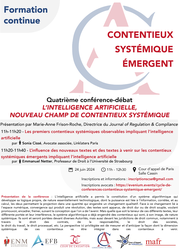
► Full Reference: L’intelligence artificielle, nouveau champ de Contentieux Systémique (Artificial intelligence, new field of Systemic Litigation), in cycle of conferences-debates "Contentieux Systémique Émergent" ("Emerging Systemic Litigation"), organised on the initiative of the Cour d'appel de Paris (Paris Cour of Appeal), with the Cour de cassation (French Court of cassation), the Cour d'appel de Versailles (Versailles Court of Appeal), the École nationale de la magistrature - ENM (French National School for the Judiciary) and the École de formation des barreaux du ressort de la Cour d'appel de Paris - EFB (Paris Bar School), under the scientific direction of Marie-Anne Frison-Roche, June 24, 2024, 11am-12.30pm, Cour d'appel de Paris, Cassin courtroom.
____
🌐see on LinkedIn the report made of this event
____
► Presentation of this conference-debate: Artificial intelligence has enabled the creation of an algorithmic system. This develops its own logic, which is essentially technological in nature. It generates computing power based on the correlation of information to produce possible causalities and build probabilities that are sometimes likened to "predictions", with the mass processed eventually generating a qualitative change.
This change is linked to the digital space itself, which by its very nature gives rise to systemic disputes and litigation, to which the conference-debate on 27 May 2024 was devoted.
There are three ways in which this Emerging Systemic Litigation is involved, and it is important to anticipate these, as the litigation is either in its infancy or still to come, but will undoubtedly arise suddenly.
Firstly, it is possible that the technological tool will make it possible to deal with certain cases where the technical nature of either the concepts or the requests, or the multitude of requests, however simple, require this ability to deal with the mass, which leads to an increase in both the mechanical power of algorithms and the greater presence of human beings, in particular through the increase in adversarial proceedings, pre-trial proceedings, mediation, etc.
Secondly, in the face of this change linked to the digital environment, 'texts' have appeared to 'regulate' the use or the very invention of this or that algorithmic tool, texts of a very diverse nature, from the most soft to the hardest (this gradation between soft and hard law is the theme taken up in the conference-debate of 19 September 2024). These may be measures taken by the firms that produce the tools, those that use them, or those that disseminate them, with the people affected by the information being relatively active. This last point explains why systemic disputes are already underway, concerning the subjective rights that would be violated either by the very nature of artificial intelligence, in this case the rights of content producers, or the rights to privacy, or protection of other Monumental Goals. The systemic and extra-territorial dimension of these disputes has already been established.
The third point is the role of Politics, since the European Union, through the texts currently being adopted, has established that the Goal is not only the sustainability of the technical system, the innovation market and European sovereignty, but also the primacy of people and individuals, through a method that is the Ex Ante ranking of risks. This conception is also contested. This methodological issue also applies to judges.
This Emerging Systemic Litigation is and will be brought before various regulatory or supervisory Authorities, but also before the administrative and judiciary courts, in particular through Contract Law, Tort Law, Company Law, Labour Law, General Procedural Law, etc.
The aim here is to measure and anticipate the way in which the systemic dimension of these disputes will be incorporated into future litigation.
____
🧮Program of this manifestation:
Fourth conference-debate
L’INTELLIGENCE ARTIFICIELLE, NOUVEAU CHAMP DE CONTENTIEUX SYSTÉMIQUE
(ARTIFICIAL INTELLIGENCE, NEW FIELD OF SYSTEMIC LITIGATION)
Paris Court of Appeal, Cassin courtroom
Presentation and moderation by 🕴️Marie-Anne Frison-Roche, Professor of Regulatory & Compliance Law, Director of the Journal of Regulation & Compliance (JoRC)
🕰️11am.-11.10am. 🎤Les deux rencontres entre l'intelligence artificielle et le Contentieux Systémique (The two meetings between Artificial Intelligence and Systemic Litigation), by 🕴️Marie-Anne Frison-Roche, Professor of Regulatory & Compliance Law, Director of the Journal of Regulation & Compliance (JoRC)
🕰️11.10am-11.30am. 🎤Les premiers contentieux systémiques observables impliquant l’intelligence artificielle (The first observable Systemic Litigations involving artificial intelligence), by 🕴️Sonia Cissé, Partner, Linklaters Paris
🕰️11.30am-11.50am. 🎤L’influence des nouveaux textes et des textes à venir sur les contentieux systémiques émergents impliquant l’intelligence artificielle (The influence of new and forthcoming legislation on Emerging Systemic Litigation involving artificial intelligence), by 🕴️Emmanuel Netter, Professor of Law at Strasbourg University
🕰️11.50am-12.30pm. Debate
____
🔴Registrations and information requests can be sent to: inscriptionscse@gmail.com
🔴For the attorneys, registrations have to be sent to the following address: https://evenium.events/cycle-de-conferences-contentieux-systemique-emergent/
⚠️The conference-debates are held in person only, in the Cour d’appel de Paris (Paris Court of Appeal).
____
🧮Read below the report made of this event by Marie-Anne Frison-Roche⤵️
Fourth conference-debate
L’INTELLIGENCE ARTIFICIELLE, NOUVEAU CHAMP DE CONTENTIEUX SYSTÉMIQUE
(ARTIFICIAL INTELLIGENCE, NEW FIELD OF SYSTEMIC LITIGATION)
under the scientific direction of Marie-Anne Frison-Roche
Monday June 24, 2024
Paris Court of Appeal, Cassin courtroom
Presentation and moderation by 🕴️Marie-Anne Frison-Roche, Professor of Regulatory & Compliance Law, Director of the Journal of Regulation & Compliance (JoRC)
🕰️11am.-11.10am. 🎤Les deux rencontres entre l'intelligence artificielle et le Contentieux Systémique (The two meetings between Artificial Intelligence and Systemic Litigation), by 🕴️Marie-Anne Frison-Roche, Professor of Regulatory & Compliance Law, Director of the Journal of Regulation & Compliance (JoRC)
- In the general presentation on the theme itself, I underlined "The two meetings between Artificial Intelligence and Systemic Litigation".
- The focus of this conference is not the state of what is usually called Artificial Intelligence, but rather how to correlate AI and "Emerging Systemic Litigation" (ESL).
- This involves recalling what "Systemic Litigation" is (1), then looking at the contribution of Artificial Intelligence to dealing with this type of litigation (2), before considering that the algorithmic system itself can be a subject of Systemic Litigation (3).
1. What is the Systemic Litigation that we see Emerging?
- On the very notion of "Emerging Systemic Litigation" (ESL), proposed in 2021, read : M.-A. Frison-Roche, 🚧The Hypothesis of the category of Systemic Cases brought before the Judge, 2021
- Emerging Systemic Litigation concerns situations that are brought before the Judge and in which a System is involved. This may involve the banking system, the financial system, the energy system, the digital system, the climate system or the algorithmic system.
- In this type of litigation, the interests and future of the system itself are at stake, "in the case". The judge must therefore "take them into consideration"📎
!footnote-3677 . - In this respect, "Emerging Systemic Litigation" must be distinguished from "Mass Litigation". "Mass litigation" refers to a large number of similar disputes. The fact that they are often of "low importance" is not necessarily decisive, as these disputes are important for the people involved and the use of A.I. must not overpower the specificity of each one. The fact remains, however, that the criterion for Systemic Litigation is the presence of a system. It may happen that a mass litigation calls into question the very interest of a system (for example, value date litigation), but more often than not the Systemic Litigation we see emerging is, unlike mass litigation, a very specific case in which one party, for example, formulates a very specific claim (e.g., asking for considerable work to be stopped) against a multinational company, and will thus "call into question" an entire value chain and the obligations incumbent on the powerful company to safeguard the climate system, which is therefore present in the proceedings (which does not, however, entitle it to make claims, but which must be taken into consideration).
2. The contribution of Algorithmic Power in the conduct of a Systemic Litigation
- In this respect, AI can be a useful, if not indispensable, tool for mastering such Systemic Litigation, the emergence of which corresponds to a novelty, and the knowledge of which is brought before the Ordinary Law Judge.
- Indeed, this type of litigation is particularly complex and time-consuming, with evidentiary issues at the heart of the case, and with expert appraisal following on from expert appraisal. Expert appraisals are difficult to carry out. AI can therefore be a means for the judge to control the expert dimension of Systemic Litigation, in order to curb the increased risk of experts capturing the judge's decision-making power.
- The choice of AI techniques presents the same difficulties as those that have always applied to experts. It is likely that certification mechanisms, analogous to registration on expert lists, will be put in place, if we move away from construction by the courts themselves (or by the government, which may pose a problem for the independence of the judiciary), or if we want control over tools provided by the parties themselves, with regard to the principle of equality of arms due to the cost of these tools.
3. When it is the Algorithmic System itself that is the subject of a Systemic Litigation: its place is then rather in defense
- Moreover, the algorithmic system itself gives rise to Systemic Litigation, in that individuals may bring a case before the courts claiming to have suffered damage as a result of the algorithmic system's operation, or seeking enforcement of a contract drawn up by the system. It is in the realm of the Ordinary Contract and Tort Law that the system may find itself involved in the jurisdictional proceedings.
- It is noteworthy that, compared with the hypotheses hitherto favored in previous conference-debates, notably those of April 26, 2024 on Emerging Systemic Litigation linked to the Duty of Vigilance📎
!footnote-3682 , the systems involved have been taken into consideration more behind the claims articulated by the plaintiffs, since they allege that a system has been attacked. It would then be "civil society" acting against the company. In the case of the algorithmic system, the initial litigation is made up of allegations that accuse the system of infringing rights (e.g. copyright, right to privacy, etc.). - However, the instance changes if the system is no longer presented as the potential "victim" but rather as the potential "culprit". In particular, it is much less clear what type of intervener in the proceedings, who is not necessarily a party to the dispute, should speak to explain the system's interest, particularly with regard to the sustainability and future of the AI system.
- This is an area for further consideration by heads of courts.
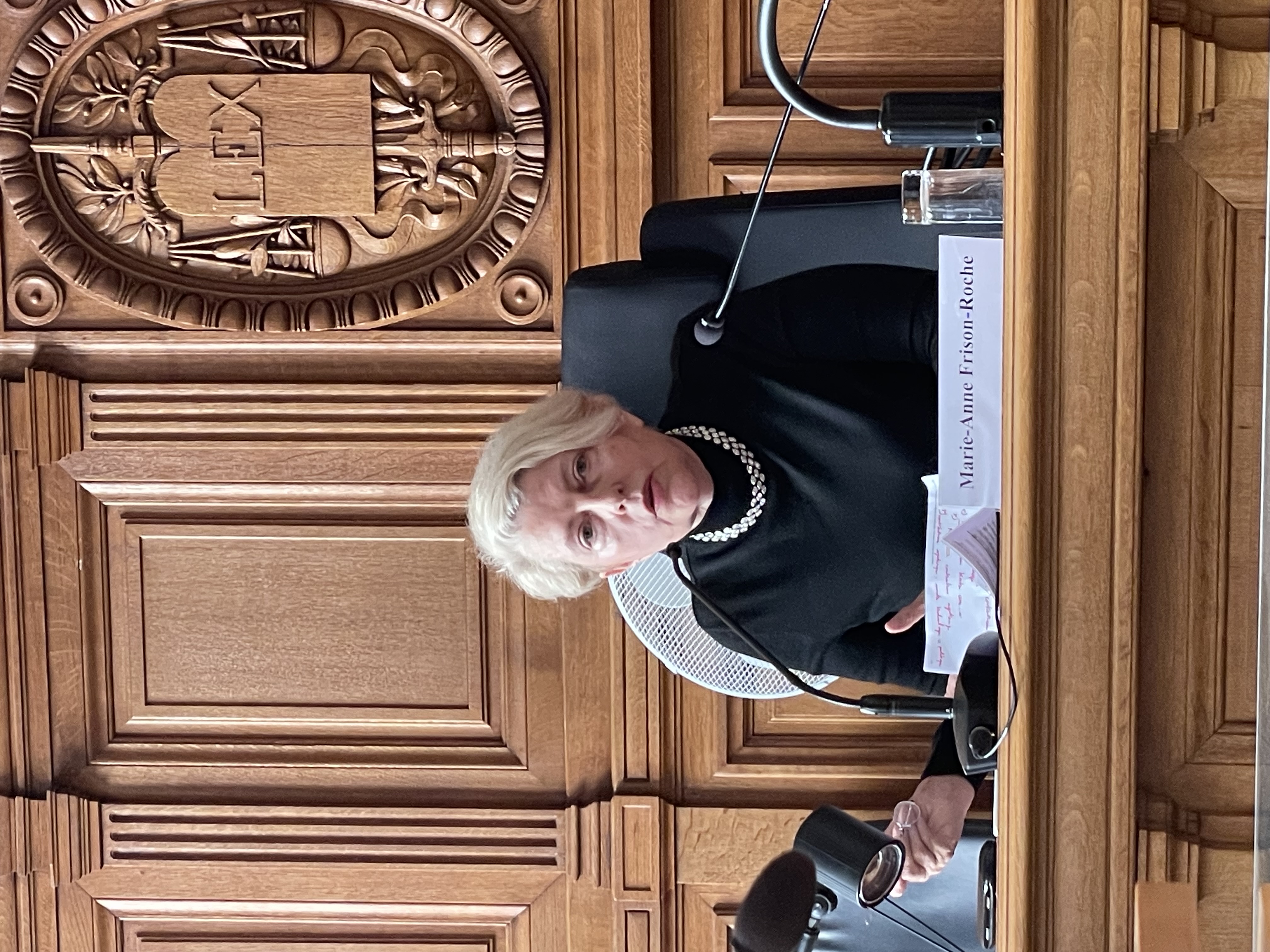
🕰️11.10am-11.30am. 🎤Les premiers contentieux systémiques observables impliquant l’intelligence artificielle (The first observable Systemic Litigations involving artificial intelligence), by 🕴️Sonia Cissé, Partner, Linklaters Paris
- Sonia Cissé outlined the first observable systemic disputes involving artificial intelligence.
- She outlines litigation already resolved or in progress, particularly in intellectual property (IP) when the information used for machine learning is protected by copyright or when the question arises of possible IP protection for "works" produced by machines.
- Firstly, she refers to a dispute that took place in China in 2019, in which a court held that an article, even one entirely generated by an AI tool, was protected by copyright for the benefit of the person who published it. She points out that, conversely, American and European courts have ruled that intellectual property cannot cover a work in which there is no human authorship, and which is therefore neither a work of the mind nor an invention. She mentions the decisions of the Columbia Court and the Prague Municipal Court in 2023. She notes that, beyond Literary and Artistic Property Law, Patent Law does not offer protection either, with the UK Supreme Court, for example, refusing to classify an AI-powered machine as an inventor.
- She then discusses the mass litigation that could arise from automated decisions, in the event of algorithmic error, and in particular the question of attribution of responsibility (developer, deployer, user?). She noted that the first legal cases, notably in the United States and Australia, placed responsibility for the error on the user.
- She went on to show that AI is a tool that courts are using, and will increasingly use, to deal with the mass litigations to which they must respond. This efficiency is leading lawyers, companies and judges to use AI to ultimately decide: this opens up the question of the responsibility of the decision, for example the court decision, or of the writings, if there is a breach observed, for example in the rules or precedents referred to. Precisely, the AI European Regulation qualifies as "high risk" the design and use of AI for jurisdictional decision-making, including in the organisation of amicable solutions. This opens up the prospect of litigation, which is and will be systemic in nature.
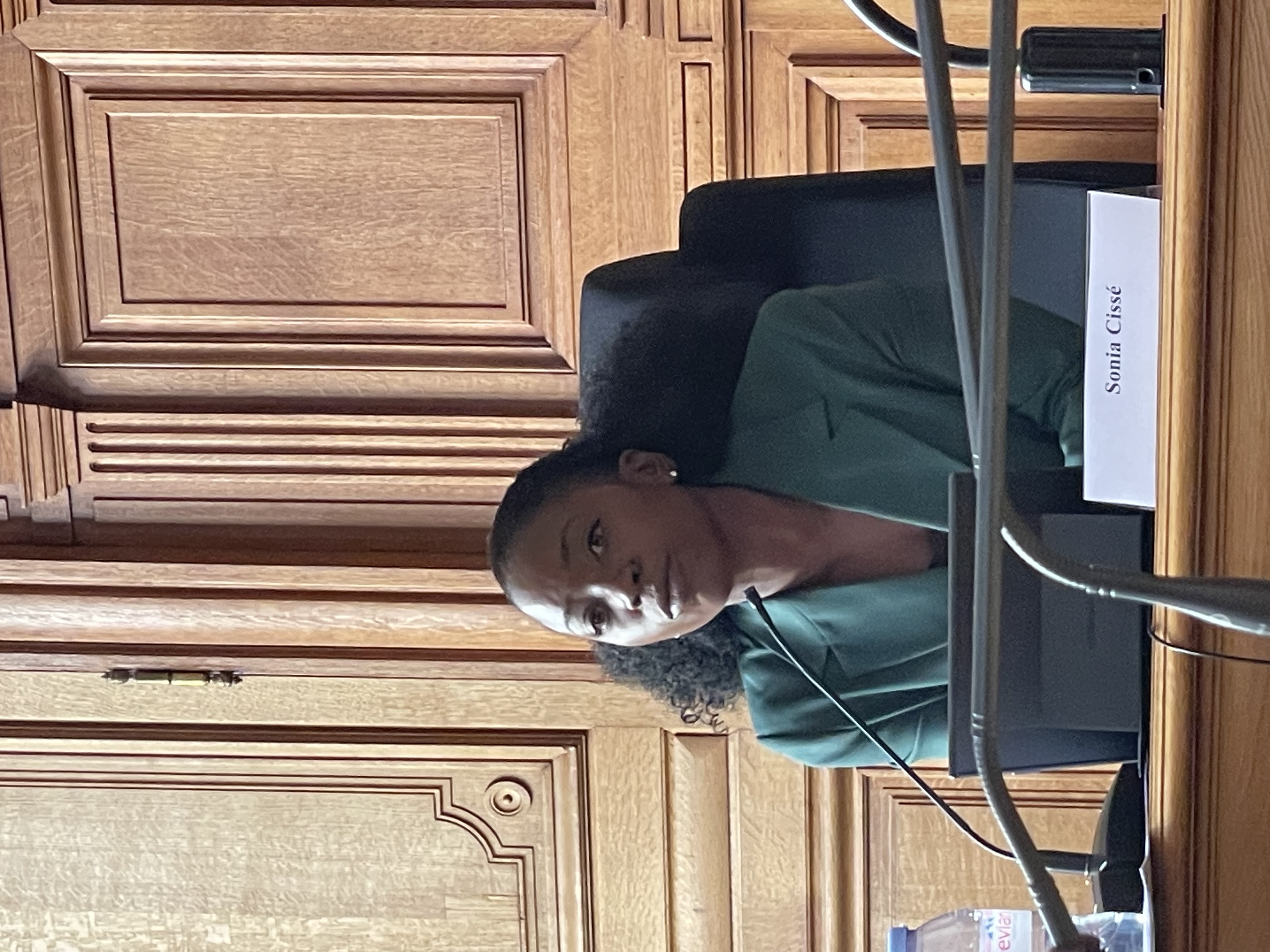
🕰️11.30am-11.50am. 🎤L’influence des nouveaux textes et des textes à venir sur les contentieux systémiques émergents impliquant l’intelligence artificielle (The influence of new and forthcoming legislation on Emerging Systemic Litigation involving artificial intelligence), by 🕴️Emmanuel Netter, Professor of Law at Strasbourg University
- Emmanuel Netter explained the impact of the regulatory texts adopted by the European Union, taking up the very nature of the AI system.
- He explained the impact of the regulatory texts adopted by the European Union, not only the IA Act but also the GDPR, such that not only the Administrative Regulatory Authorities but also the Ordinary Law Judge are called upon to implement it, notably through liability actions.
- The speaker made two preliminary remarks.
- Firstly, he stressed that the authors see AI either as the solution to everything, or as the source of all future disasters.
- Secondly, he emphasised that there are two kinds of algorithmic power: the one that can be thought of as no more than a tool for deduction based on rules and principles, and the other that can be thought of as the power to accumulate particular solutions without any deduction, so that solutions for the next particular case can be found, or even invented ("machine learning", "deep learning").
- As for the texts, the speaker begins by recalling that the 2016 GDPR, without dealing with artificial intelligence, laid down the principle, in Article 22, of the prohibition of "solely" automated processing. In this regard, he notes that although exceptions to this prohibition are provided for, the Court of Justice adopts a broad interpretation of this article and of the notion of "solely automated processing", a position that is resolutely protective of the human person (see in particular ECJ, December 7, 2023, case C-634/21, Schuffa).
- He then discusses the regulation establishing harmonised rules for artificial intelligence, known as the "Artificial Intelligence Act", and focuses on so-called "high-risk" AI and the obligations arising from this qualification: analysis of reasonably foreseeable risks and prior testing (art. 9); "data governance" obligations (art. 10) and related evidential obligations; transparency (art. 13); proportionate human oversight (art. 14); accuracy and robustness (art. 15), etc.
- All this information enables the speaker to spell out the systemic disputes that will arise from these clashes of overall understanding and the regulatory logic of technological systems. In particular, this will take the form of civil liability litigation. He underlines the evidentiary stakes involved.
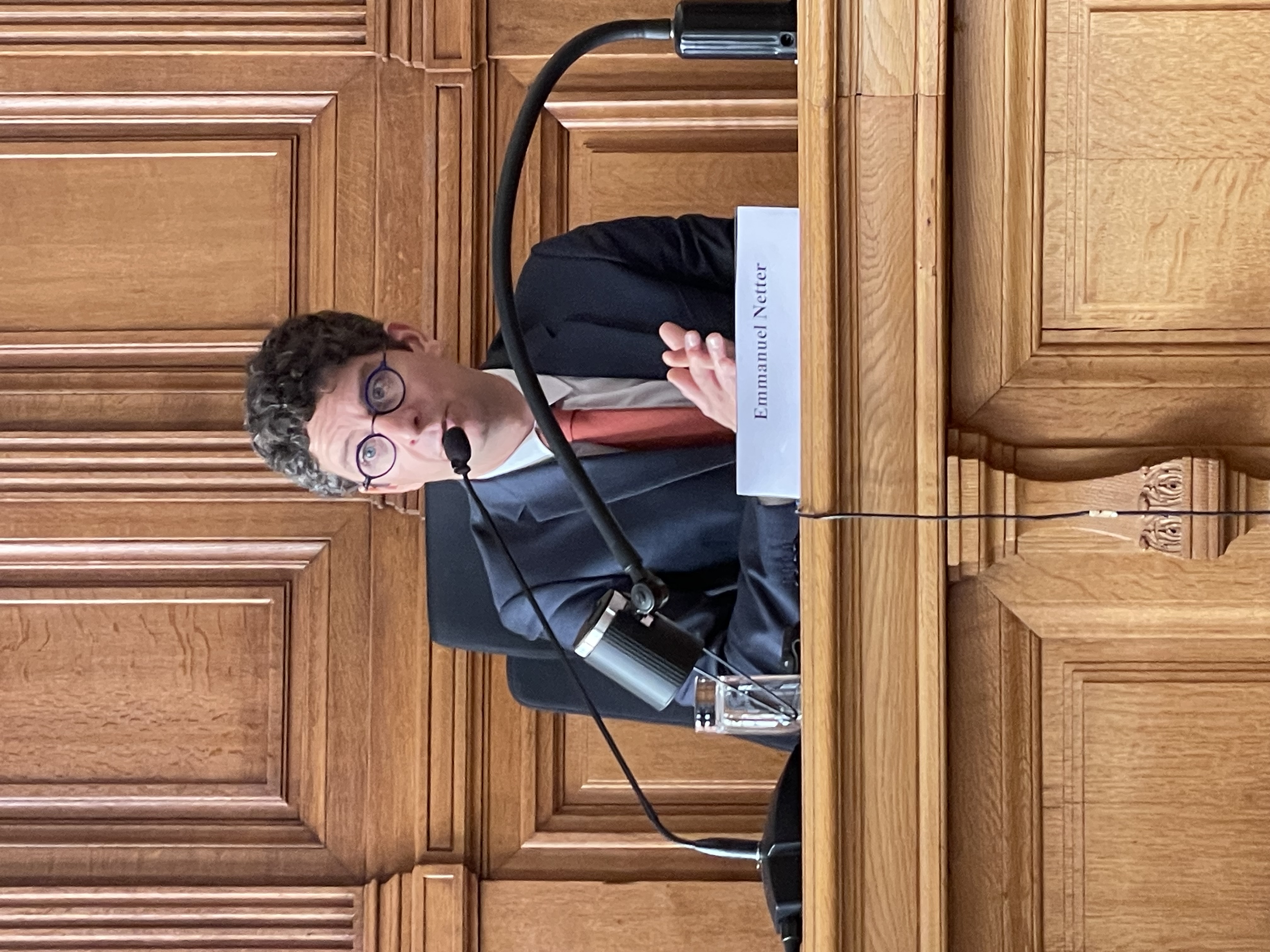
🕰️11.50am-12.30pm. Debate
Conclusion
- At the end of this conference, the listener can appreciate that mass litigation can eventually, and with great caution, find support in AI, because the successive cases are analogous.
- On the other hand, Emerging Systemic Litigation is characterised precisely by the fact that it mobilises a System, in that the situation it presents (e.g. a case of platform supervision, a case of vigilance in a value chain) is new and involves the interests and future of a system by "calling into question" principles : Because it is "emergent", it is essentially the fruit of the inventiveness of companies, stakeholders, lawyers and judges, because they are singular human beings.
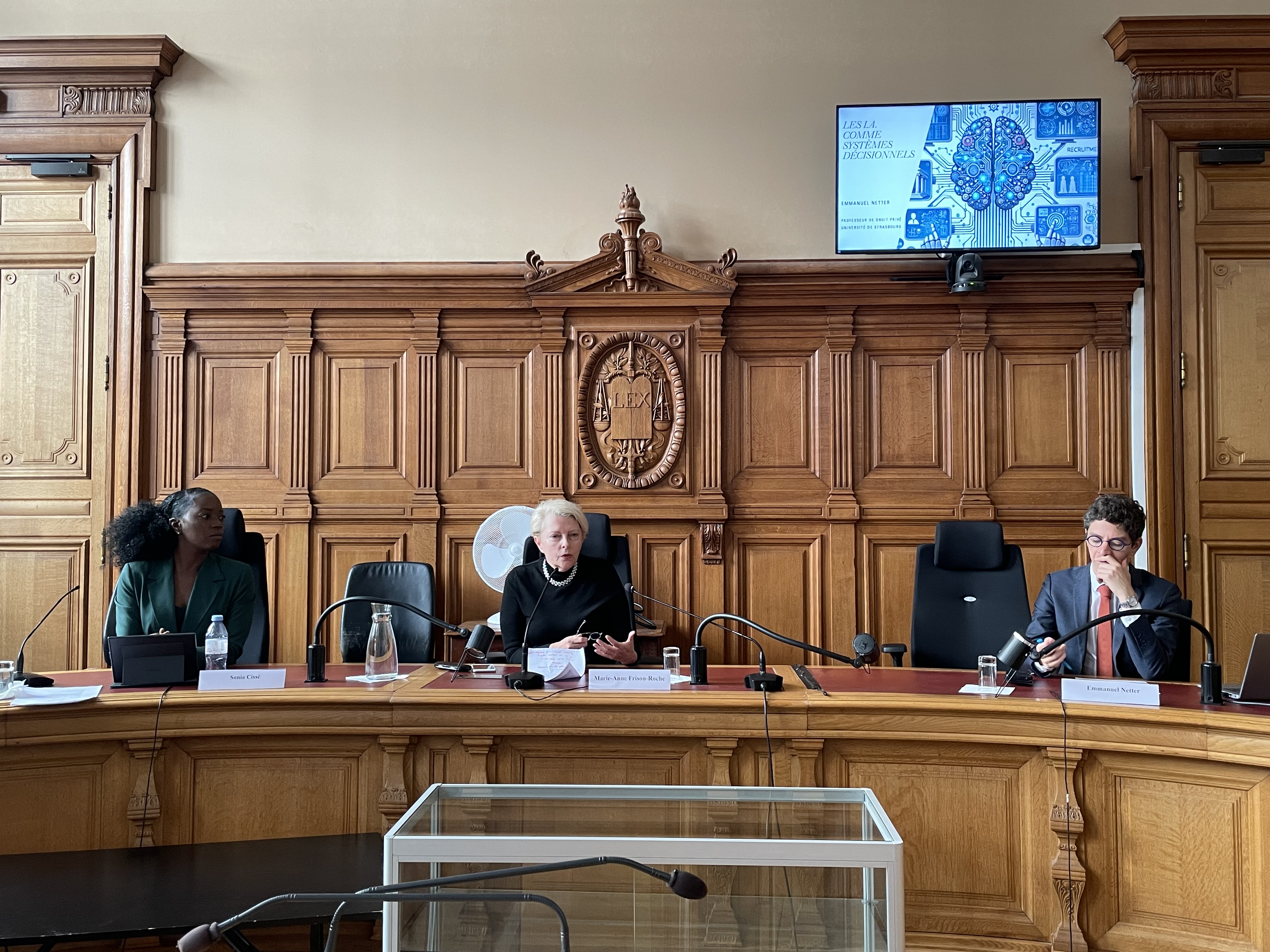
________
🕴️Fr. Ancel, 📝Compliance Law, a new guiding principle for the Trial?, in 🕴️M.-A. Frison-Roche (ed.), 📘Compliance Jurisdictionalisation, 2024.
🧮La vigilance, nouveau champ de contentieux systémique (Vigilance, new field of Systemic Litigation), in cycle of conference-debates "Contentieux Systémique Émergent" ("Emerging Systemic Litigation"), organised on the initiative of the Cour d'appel de Paris (Paris Cour of Appeal), with the Cour de cassation (French Court of cassation), the Cour d'appel de Versailles (Versailles Court of Appeal), the École nationale de la magistrature - ENM (French National School for the Judiciary) and the École de formation des barreaux du ressort de la Cour d'appel de Paris - EFB (Paris Bar School), under the scientific direction of Marie-Anne Frison-Roche, June 24, 2024.

comments are disabled for this article